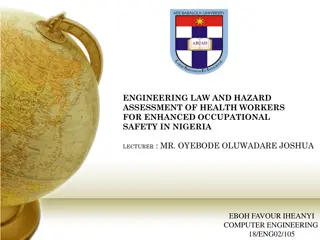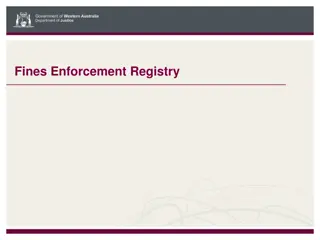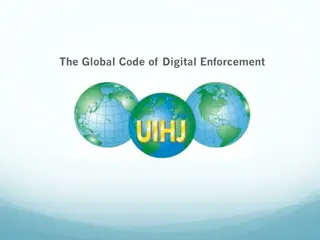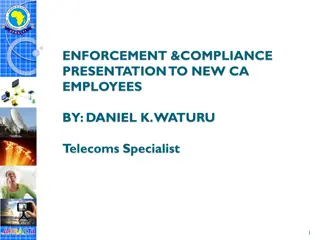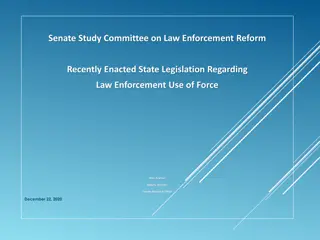Challenges in Addressing Mental Health in Law Enforcement
Despite increased accessibility to mental health treatment, the numbers of law enforcement suicides and PTSD remain high. Current psychological/behavioral programs focus on prevention rather than providing tools for survivors. Critical incident stress management plays a crucial role in supporting emergency service providers through traumatic events and occupational stress.
Download Presentation

Please find below an Image/Link to download the presentation.
The content on the website is provided AS IS for your information and personal use only. It may not be sold, licensed, or shared on other websites without obtaining consent from the author. Download presentation by click this link. If you encounter any issues during the download, it is possible that the publisher has removed the file from their server.
E N D
Presentation Transcript
WHY CANT WE FIX THE PROBLEM? Mental health treatment is more accessible than ever Departments and individuals are more open to it Why are the numbers of Law Enforcement suicides, PTSD, etc. still so high?
WHY CANT WE FIX THE PROBLEM? Psychological/behavioral programs involving resilience, education and prevention have all been tactical in nature. That is, they are designed to prevent the worst from happening. Why not assume the worst has happened and provide people with the tools and knowledge needed to minimize and mitigate the damage and ultimately survive.
I. In this section: (a) "Critical incident" means an event or events that result in acute or cumulative psychological stress or trauma to an emergency service provider as a result of response to the incident. (b) "Critical incident stress" means an unusually strong emotional, cognitive, or physical reaction that has the potential to interfere with normal functioning and that results from the response to a critical incident or long-term occupational exposure to a series of critical incident responses over a period of time that are believed to be causing debilitating stress that is affecting an emergency service provider and his or her work performance or family situation. This may include, but is not limited to, physical and emotional illness, failure of usual coping mechanisms, loss of interest in the job, personality changes, or loss of ability to function. (c) "Critical incident stress management" means a process of crisis intervention designed to assist emergency service providers in coping with the psychological trauma resulting from response to a critical incident. (d) "Critical incident stress management and crisis intervention services" means consultation, counseling, debriefing, defusing, intervention services, management, prevention, and referral provided by a critical incident stress management team member. (e) "Critical incident stress management team" or "team" means the group of one or more trained volunteers, including members of peer support groups organized by a unit of state, local, or county government who offer critical incident stress management and crisis intervention services following a critical incident or long term or continued, debilitating stress being experienced by emergency services providers and affecting them or their family situation. (f) "Critical incident stress management team member" or "team member" means an emergency services provider, including any law enforcement officer, sheriff or deputy sheriff, state police officer, civilian law enforcement employee, firefighter, civilian fire department employee, and emergency medical personnel, specially trained to provide critical incident stress management and crisis intervention services as a member of an organized and registered team. II. (a) Team members shall undergo and sustain certification standards set forth in guidelines established by the International Critical Incident Stress Foundation (ICISF) approved by the commissioner of the department of safety, or a similar organization for which the commissioner shall not unreasonably withhold approval. The team shall be registered with ICISF, or a similar organization, and maintain training standards to date as required. (b) All critical incident stress management team members, sworn or civilian, shall be designated by the police chief, sheriff, commander of the state police, fire chief, or director of emergency services. III. (a) Any information divulged to the team or a team member during the provision of critical incident stress management and crisis intervention services shall be kept confidential and shall not be disclosed to a third party or in a criminal, civil, or administrative proceeding. Records kept by critical incident stress management team members are not subject to subpoena, discovery, or introduction into evidence in a criminal, civil, or administrative action. Except as provided in subparagraph (c), no person, whether critical incident stress management team member or team leader providing or receiving critical incident stress management and crisis intervention services, shall be required to testify or divulge any information obtained solely through such crisis intervention. (b) The purpose of this section is to provide a consistent framework for the operation of critical incident stress management teams and their members. In any civil action against any individual, agency, or government entity, including the state of New Hampshire, arising out of the conduct of a member of such team, this section is not intended and shall not be admissible to establish negligence in any instance where requirements herein are higher than the standard of care that would otherwise have been applicable in such action under state law. (c) A communication shall not be deemed confidential pursuant to this section if: (1) The communication indicates the existence of a danger to the individual who receives critical incident stress management and crisis intervention services or to any other person or persons. (2) The communication indicates the existence of past child abuse or neglect of the individual, abuse of an adult as defined by law, or family violence as defined by law. (3) The communication indicates the existence of past or present acts constituting an intentional tort or crime, provided the applicable statute of limitation has not expired on the act indicated. Source. 2013, 74:1, eff. June 6, 2013. NH RSA 153-A:17-a
Peer Support Team members will maintain confidentiality to ensure the nature of the Peer program. An Example: 1. The Peer Support Program is a confidential program. No records identifying employees who utilize the program will be maintained. 2. Peer Support Team Members shall not discuss information obtained while acting in a Peer Support capacity with anyone other than the Mental Health Professional or his/her designee for the purpose of mental health support unless required by law. Peer Support Team Members shall not divulge shared information with other employees, family members, friends, supervisors or management, or the general public. PFFNH Confidentiality Agreement 3. It is the Peer's responsibility to notify the members, prior to meeting, of the circumstances they cannot hold confidential. 4. If these guidelines are found to be breached then the board has the right to convene and discuss that the Peers may be asked to remove themselves from the Peer Team, as outlined in the Process of Discipline.
CRITICAL INCIDENTS (The Terrible 10 ) LOD deaths threat of violence or personal injury serious LOD injury inability to intervene death of a child injury to fellow officer serious injury to a child suicide of fellow worker death of another (circumstance dependent) excessive media attention
CRITICAL INCIDENTS (The Terrible 10 ) (CONT.) multicasualty incident or disaster prolongation of the incident personally knowing the victim(s) any other significant event which meets definitional criteria police involved shooting
CRITICAL INCIDENT DEFINITION Sudden, powerful events Fall outside the range of normal human experience Strong emotional impact accompanies event(s)
CRITICAL INCIDENTSTRESS MANAGEMENT (CISM) PHILOSOPHY First Responders have real feelings First Responders are often required to hide/mask their feelings in order to complete the task at hand These feelings may be repressed and later expressed in negative ways
CISM assists in accelerating the healing process may prevent further emotional injury counters the superman image & makes it easier for the officer to seek assistance includes all involved provides a forum for the clarification and demystification of what has and what will happen
CISM (cont.) provides group support & solidarity assists with the establishment of a healthy & supportive work environment provides needed information assists with detection of those who require additional help
CISM (cont.) fosters interagency cooperation demonstrates a desire by a given organization to assist members
CRITICAL IINCIDENT STRESS DEBRIEFING (CISD) OBJECTIVES air the intense emotions associated with the incident(s) group support begin the grieving process dispel rumor & fallacy reinforce the belief that intense emotional reactions are the norm in such situations
CISD OBJECTIVES (cont.) prepare for protracted grief education concerning the emotional, physiological, and cognitive byproducts of crisis additional education relative to stress responses reinforce the fact that additional assistance is available and often necessary
CISD PROCESS & COMPONENTS Structured, group process utilization of trained team deal with emotional & physical aftershock confidential, non-evaluative discussion of incident(s) not therapy (but insight may be gained) education
DEFUSING DEFUSING-a small group intervention conducted generally within eight hours of the conclusion of a critical incident DEFUSING-one peer member to eight first responders DEFUSING-not conducted at the scene of the critical incident DEFUSING- ~45 minutes DEFUSING-three-step process consisting of: 1) an introduction, 2) exploration, and 3) information.
what peer support is: Peer support is a non-professional interpersonal interaction that is based upon a common experience or history. Provide a trained and empathetic listening ear. Start the education around normal stress responses and strategies used to mitigate effects. Peers who are trained to listen and provide emotional support and assist with finding appropriate professional mental health treatment resources. Bridge to Resources
Peer Support & CISM Team Team s function is to provide our personnel & their family with mental health support services which mitigates stress, both at home and on the job. Team provides peer support to address veteran s issues, trauma responses, family/relationship issues, financial issues, legal problems, gambling, substance misuse, personal stress and job stress.
PFFNH peer support team The PFFNH Peer Support Team s mission is to recognize that all fire service personnel and EMS members are human beings who will be exposed to traumatic incidents and experience emotions. Peer Support provides a safe, non-judgmental, and confidential environment where members can engage in a healing conversation with a peer. Increased mental health awareness can lead to a reduction of stigma associated with mental health and mental health treatment. Stigma may be reduced both individually and within an organization. With greater mental health awareness also leads to increased recognition of behavioral health problems among peers (Anderson, et. al., 2020). Increased mental health awareness can be gained through: behavioral health awareness training Active Peer Support Team Peer Support station visits
New Hampshire Peer Support & CISM Team Regionalization efforts There are approximately 38 Law Enforcement Departments across NH with trained Peer Support/CISM Personnel These departments are currently working together to regionalize Peer Support/CISM Team efforts around the state and will work with all first responders Examples include: Included are the Southern NH CISM and Peer Support Team, The Granite State Team The Lakes Regional CISM Peer Support Team Various individual departmental teams
New Hampshire Peer Support & CISM Team Regionalization efforts Southern New Hampshire Regional CISM Team (Hillsborough County) Central New Hampshire Regional CISM Team (Merrimack County) Bedford Goffstown Allenstown Hillsborough County Sheriff's Office Bow Hollis Hudson Concord (Police, Fire) Litchfield Dumbarton Manchester (Police, Fire) Franklin Merrimack Nashua (Police, Fire & EMS) Hooksett Pelham Hopkinton Merrimack County Sheriff's Office
New Hampshire Peer Support & CISM Team Regionalization efforts Lakes Region CISM Team (Grafton & Carroll County) New Hampshire State Police Seacoast Regional CISM Team (Rockingham & Strafford County) Granite State CISM Ashland Barrington Bristol (Fire) Hidden Battles Foundation (NH & MA Supported) Dover Lincoln Greenland Moultonborough Hampton Plymouth Londonderry Wood Stock Portsmouth Cheshire County Rye Cheshire County Sheriff s Office Salem Keene Seabrook Sullivan County Stratford County Sheriff's Office Claremont UNH Police
Benefits of effective peer support Peer support, informal support, and (technology-based approaches?) offer opportunities to minimize stigma and structural barriers to better engage firefighters in treatment (Johnson et. al., 2020). Realize you are not alone Express feelings that have been previously suppressed or not acknowledged Learn helpful information educational component may be the most import aspect of peer support Caring, kindness, and common sense can go a long way to helping trauma survivors along the path to healing (Hooley et. al., 2020). Gain hope First responders are solutions focused
Peer support is not: Behavioral health treatment. A replacement for professional mental health guidance/support. Psychotherapy Peer Supporters are not mental health care professionals.
Role of Mental Health Professionals Must be culturally competent Occupy the position of clinical director Be involved in supervision and training of peer team members Assist with program development, implementation and future expansion Help normalize the peer support teams efforts/functionality within their department/culture






